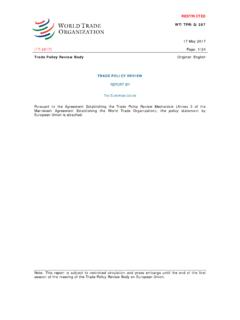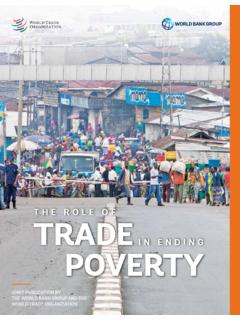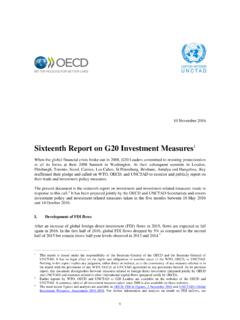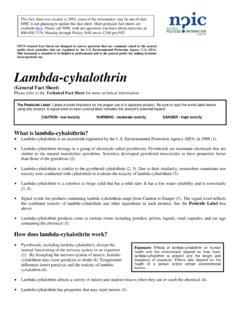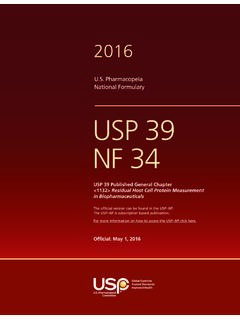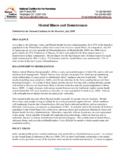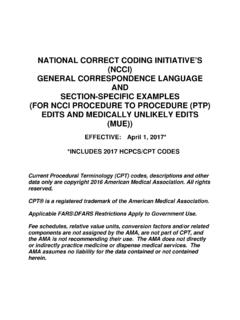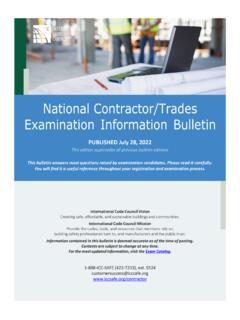Transcription of ARTICLE XXI SECURITY EXCEPTIONS - World Trade …
1 ARTICLE XXI SECURITY EXCEPTIONS I. TEXT OF ARTICLE XXI .. 599 II. INTERPRETATION AND APPLICATION OF ARTICLE XXI .. 600 A. SCOPE AND APPLICATION OF ARTICLE XXI .. 600 1. Paragraphs (a) and (b): it considers .. essential SECURITY interests .. 600 2. Paragraph (a): furnish .. any information .. 601 3. Paragraph (b): action .. 602 (1) relating to fissionable materials or the materials from which they are derived .. 602 (2) relating to the traffic in arms, ammunition and implements of war and to such traffic in other goods and materials as is carried on directly or indirectly for the purpose of supplying a military establishment .. 602 (3) taken in time of war or other emergency in international relations .. 602 4. Paragraph (c): any action in pursuance of its obligations under the United Nations Charter for the maintenance of international peace and SECURITY .
2 605 5. Other invocations of ARTICLE XXI .. 605 6. Procedures concerning notification of measures under ARTICLE XXI .. 605 B. RELATIONSHIP BETWEEN ARTICLE XXI AND OTHER ARTICLES OF THE general AGREEMENT .. 606 1. Articles I and XIII .. 606 2. ARTICLE XXIII .. 606 C. RELATIONSHIP BETWEEN ARTICLE XXI AND general INTERNATIONAL LAW .. 608 III. PREPARATORY WORK .. 608 IV. RELEVANT DOCUMENTS .. 610 I. TEXT OF ARTICLE XXI ARTICLE XXI SECURITY EXCEPTIONS Nothing in this Agreement shall be construed (a) to require any contracting party to furnish any information the disclosure of which it considers contrary to its essential SECURITY interests; or (b) to prevent any contracting party from taking any action which it considers necessary for the protection of its essential SECURITY interests (i) relating to fissionable materials or the materials from which they are derived; (ii) relating to the traffic in arms, ammunition and implements of war and to such traffic in other goods and materials as is carried on directly or indirectly for the purpose of supplying a military establishment; (iii) taken in time of war or other emergency in international relations.
3 Or (c) to prevent any contracting party from taking any action in pursuance of its obligations under the United Nations Charter for the maintenance of international peace and SECURITY . 600 ANALYTICAL INDEX OF THE GATT II. INTERPRETATION AND APPLICATION OF ARTICLE XXI A. SCOPE AND APPLICATION OF ARTICLE XXI 1. Paragraphs (a) and (b): it considers .. essential SECURITY interests During discussions in the Geneva session of the Preparatory Committee, in response to an inquiry as to the meaning of essential SECURITY interests , it was stated by one of the drafters of the original Draft Charter that We gave a good deal of thought to the question of the SECURITY exception which we thought should be included in the Charter. We recognized that there was a great danger of having too wide an exception and we could not put it into the Charter, simply by saying: by any Member of measures relating to a Member's SECURITY interests, because that would permit anything under the sun.
4 Therefore we thought it well to draft provisions which would take care of real SECURITY interests and, at the same time, so far as we could, to limit the exception so as to prevent the adoption of protection for maintaining industries under every conceivable circumstance.. there must be some latitude here for SECURITY measures. It is really a question of balance. We have got to have some EXCEPTIONS . We cannot make it too tight, because we cannot prohibit measures which are needed purely for SECURITY reasons. On the other hand, we cannot make it so broad that, under the guise of SECURITY , countries will put on measures which really have a commercial purpose . The Chairman of Commission A suggested in response that the spirit in which Members of the Organization would interpret these provisions was the only guarantee against abuses of this During the discussion of the complaint of Czechoslovakia at the Third Session in 1949 (see page 602) it was stated, inter alia, that every country must be the judge in the last resort on questions relating to its own SECURITY .
5 On the other hand, every contracting party should be cautious not to take any step which might have the effect of undermining the general Agreement .2 In 1961, on the occasion of the accession of Portugal, Ghana stated that its boycott of Portuguese goods was justified under the provisions of ARTICLE XXI:(b)(iii), noting that .. under this ARTICLE each contracting party was the sole judge of what was necessary in its essential SECURITY interest. There could therefore be no objection to Ghana regarding the boycott of goods as justified by SECURITY interests. It might be observed that a country s SECURITY interests might be threatened by a potential as well as an actual danger. The Ghanaian Government s view was that the situation in Angola was a constant threat to the peace of the African continent and that any action which, by bringing pressure to bear on the Portuguese Government, might lead to a lessening of this danger, was therefore justified in the essential SECURITY interests of Ghana.
6 3 During the Council discussion in 1982 of Trade restrictions applied for non-economic reasons by the EEC, its member States, Canada and Australia against imports from Argentina (see page 603), the representative of the EEC stated that the EEC and its member States had taken certain measures on the basis of their inherent rights, of which ARTICLE XXI of the general Agreement was a reflection. The exercise of these rights constituted a general exception, and required neither notification, justification nor approval, a procedure confirmed by thirty-five years of implementation of the general Agreement. He said that in effect, this procedure showed that every contracting party was - in the last resort - the judge of its exercise of these rights . The representative of Canada stated that Canada s sovereign action was to be seen as a political response to a political issue.
7 Canada was convinced that the situation which had necessitated the measures had to be satisfactorily resolved by appropriate action elsewhere, as the GATT had neither the competence nor the responsibility to deal with the political issue which had been raised. His delegation could not, therefore, accept the notion that there had been a violation of the general Agreement .4 The representative of Australia stated that the Australian measures were in conformity with the provisions of ARTICLE XXI:(c), which did not require notification or justification .5 The representative of the United States stated that The general Agreement left to each contracting party the judgment as to what it 1 EPCT/A/PV/33, p.
8 20-21 and ; see also EPCT/A/SR/33, p. 3. 2 , Corr. 1. , p. 196. 4C/M/157, p. 10. 5C/M/157, p. 11. ARTICLE XXI - SECURITY EXCEPTIONS 601 considered to be necessary to protect its SECURITY interests. The CONTRACTING PARTIES had no power to question that judgement .6 The representative of Argentina noted that it had attempted to submit to GATT only the Trade aspects of this case and stated that in order to justify restrictive measures a contracting party invoking ARTICLE XXI would specifically be required to state reasons of national SECURITY .. there were no Trade restrictions which could be applied without being notified, discussed and justified .7 Paragraph 7(iii) of the Ministerial Declaration adopted 29 November 1982 at the Thirty-eighth Session of the CONTRACTING PARTIES provides that.
9 The contracting parties undertake, individually and jointly: .. to abstain from taking restrictive Trade measures, for reasons of a non-economic character, not consistent with the general Agreement .8 The question of whether and to what extent the CONTRACTING PARTIES can review the national SECURITY reasons for measures taken under ARTICLE XXI was discussed again in the GATT Council in May and July 1985 in relation to the US Trade embargo against Nicaragua which had taken effect on 7 May While a panel was established to examine the US measures, its terms of reference stated that the Panel cannot examine or judge the validity or motivation for the invocation of ARTICLE XXI(b)(iii) by the United States .10 In the Panel Report on United States - Trade Measures affecting Nicaragua , which has not been adopted, .. The Panel noted that, while both parties to the dispute agreed that the United States, by imposing the embargo, had acted contrary to certain Trade -facilitating provisions of the general Agreement, they disagreed on the question of whether the non-observance of these provisions was justified by ARTICLE XXI(b)(iii).
10 The Panel further noted that, in the view of Nicaragua, this provision should be interpreted in the light of the basic principles of international law and in harmony with the decisions of the United Nations and of the International Court of Justice and should therefore be regarded as merely providing contracting parties subjected to an aggression with the right of self-defence. The Panel also noted that, in the view of the United States, ARTICLE XXI applied to any action which the contracting party taking it considered necessary for the protection of its essential SECURITY interests and that the Panel, both by the terms of ARTICLE XXI and by its mandate, was precluded from examining the validity of the United States invocation of ARTICLE XXI. The Panel did not consider the question of whether the terms of ARTICLE XXI precluded it from examining the validity of the United States invocation of that ARTICLE as this examination was precluded by its mandate.




